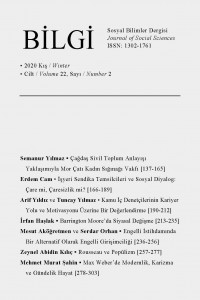Öz
Rousseau, yakın dönemde yükselen popülizm bağlamında tartışma konusu olmuştur. Bir kısım yazarlara göre Rousseau, özellikle egemenlik, genel irade, ortak iyi ve homojen toplum anlayışları nedeniyle popülizmin önemli kaynaklarından birisidir. Bu çalışmada, Rousseau’nun teorisinin bazı unsurlarının, popülist siyaset tarafından rahatlıkla istismar edilebileceği kabul edilmekle birlikte, popülizmin kaynağı olarak yorumlanamayacağı ileri sürülmektedir. Rousseau’nun teorisi, iddiaların aksine, popülist rejimlerin, siyasetçi tipinin ve siyaset yapma tarzının eleştirisi olarak rahatlıkla okunabilir. Rousseau’nun en temel kaygısı, bireyler arasında her türden istismarın engellenmesidir. Bilgi, beceri, gelir, konum ve statü farklılıklarından kaynaklanabilecek her türden eşitsizlikler; bu eşitsizliklerin yol açabileceği sosyal sınıfların ve ayrışmanın üreteceği tahakküm, kibir, küçümseme, insana insan olduğu için değil de sahip olduğu şeyler ve konumu üzerinden değer biçme, Rousseau’nun kurguladığı ideal toplumun tümüyle ortadan kaldırmaya çalıştığı ahlaki yozlaşma biçimleridir. Rousseau’nun insan onur ve haysiyetine aykırı görerek ortadan kaldırmaya çalıştığı kurumsal yapılar, tutum, davranış ve zihniyet dikkate alındığında popülizmin ahlaki tefessühün bir versiyonu olduğu görülür.
Anahtar Kelimeler
Kaynakça
- Bertram, Christopher (2020), “Jean Jacques Rousseau”, The Stanford Encyclopedia of Philosophy, in (ed.) Edward N. Zalta, https://plato.stanford.edu/archives/sum2020/entries/rousseau/ Erişim tarihi: 15.09.2020.
- Billing, Andrew. (2013), “Political Anthropology and its Animal Other in Rousseau's ‘Discours sur l'inégalité’”, French Forum, 38(1/2): 1-17.
- Canovan, Margaret (1999), “Trust the People! Populism and the Two Faces of Democracy”, Political Studies, XLVII: 2-16.
- Conniff, J. (1975), “On the Obsolescence of the General Will: Rousseau, Madison, and the Evolution of Republican Political Thought”, The Western Political Quarterly, 28(1): 32-58.
- Crick, Sir Bernard (2005), “Populism, politics and democracy”, Democratisation, 12(5): 625-632.
- Dijn, Annelien de (2018), “Rousseau and Republicanism”, Political Theory, 46(1): 59-80.
- Duignan, Brian (2020), “Popülist Movement”, https://www.britannica.com/event/Popülist-Movement Erişim tarihi: 15.09.2020.
- Ferrell, Jason (2009), “Isaiah Berlin: Liberalism and pluralism in theory and practice”, Contemporary Political Theory, 8(3): 295-316.
- Garrard, G. (2014), “Rousseau, Happiness and Human Nature”, Political Studies, 62(1): 70-82.
- Garrard, G. (2019), “The prophet of national populism”, UnHerd, https://unherd.com/2019/08/the-prophet-of-national-populism/ Erişim tarihi: 15.09.2020.
- Gerson, Michael (2017), “Trump’s foreboding address and ominous ‘hour action’”, Ames Tribune, (January 27, 2017).
- Gauss, Gerald. F. (2003), Contemporary Theories of Liberalism: Public Reason as a Post-Enlightenment Project, Londra: SAGE Publications.
- Horowitz, A. (1990), “‘Laws and Customs Thrust Us Back into Infancy’: Rousseau's Historical Anthropology”, The Review of Politics, 52(2): 215-241.
- Jack, Malcolm. (1978), “One State of Nature: Mandeville and Rousseau”, Journal of the History of Ideas, 39(1): 119-124.
- Lecercle, J. L. (2010), ”Jean-Jacques Rousseau: Hayatı ve Eserleri”, İnsanlar Arasında Eşitsizliğin Kaynağı, Çeviri: Rasih N. İleri, İstanbul: Say Yayınları, ss. 13-60.
- Mudde, Cas (2004), “The Popülist Zeitgeist”, Government and Opposition, 39(4): 541-563.
- Mudde, Cas ve Kaltwasser, C. R. (2017), Populism: A Very Short Introduction, Oxford: Oxford University Press.
- Munro, Andre (2020), “Populism”, https://www.britannica.com/topic/populism Erişim tarihi: 15.09.2020.
- Müller, Jan-Werner (2016), What Is Populism?, Philadelphia: University of Pennnsylvania Press.
- Pedler, Anne (1927), “Going to the People: The Russian Narodniki in 1874-5”, The Slavonic Review, 6(16): 130-141.
- Rosenblatt, Helena (2009), Rousseau and Geneva: From the First Discourse to The Social Contract, 1749–1762, Cambridge: Cambridge University Press.
- Rousseau, J. J. (1986), Political Writings, (Çeviri ve ed.) Frederick Watkins, Wisconsin: The University of Wisconsin Press.
- Rousseau, J. J. (1994), Toplum Sözleşmesi, Çeviri: Vedat Günyol, İstanbul: Adam Yayınları.
- Rousseau, J. J. (2009), Bilimler ve Sanatlar Üzerine Söylev, Çeviri: İsmail Yerguz, İstanbul: Say Yayınları.
- Rousseau, J. J. (2010), İnsanlar Arasında Eşitsizliğin Kaynağı, Çeviri: Rasih N. İleri, İstanbul: Say Yayınları.
- Scott, John T. (2005), “Rousseau's Anti-Agenda-Setting Agenda and Contemporary Democratic Theory”, The American Political Science Review, 99(1): 137-144.
- Shklar, J. (1966), “Rousseau’s Two Models: Sparta and the Age of Gold”, Political Science Quarterly, 81(1):25-51.
- Uslu, Cennet (2020), “Popülist Egemenlik Anlayışının Teorik Kökenleri: Rousseau ve Schmitt”, DÜHFD, 25(42):3-38.
- Zagorin, P. (2003), “Republicanism”, British Journal for the History of Philosophy, 11(4): 701-714.
Ayrıntılar
| Birincil Dil | Türkçe |
|---|---|
| Bölüm | Makaleler |
| Yazarlar | |
| Yayımlanma Tarihi | 27 Aralık 2020 |
| Gönderilme Tarihi | 5 Kasım 2020 |
| Yayımlandığı Sayı | Yıl 2020 Cilt: 22 Sayı: 2 |
Twitter Google Akademik Academia.edu
@DergisiBilgi Bilgi Dergisi Google Akademik Hesabı Bilgi Dergisi Academia.edu Hesabı

Bu eser Creative Commons Atıf 4.0 Uluslararası Lisansı ile lisanslanmıştır.


